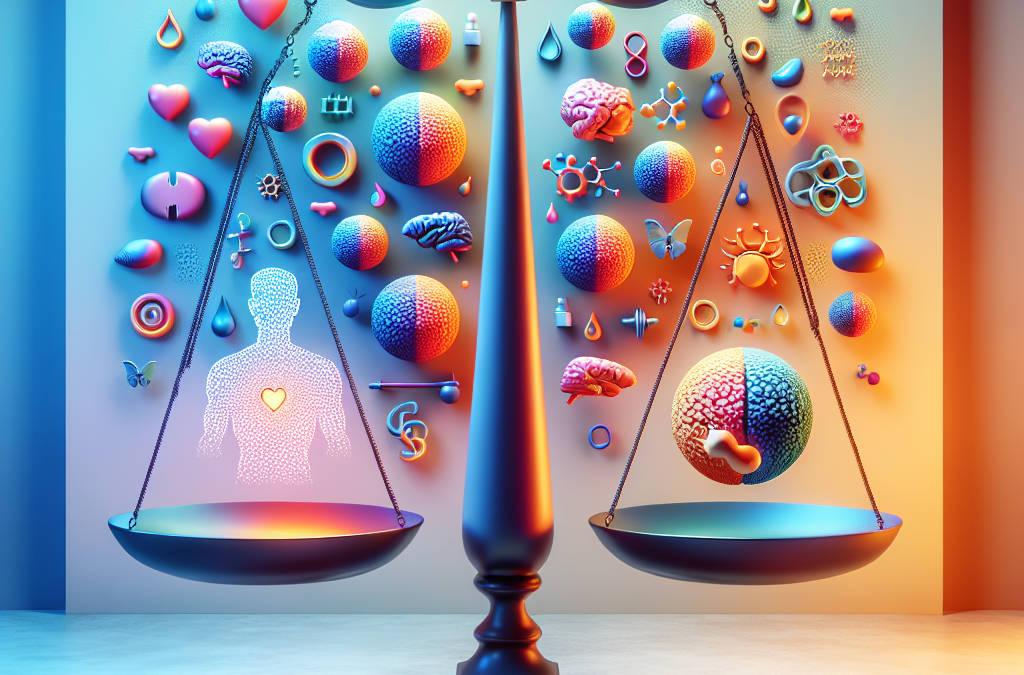[ad_1]
Hormones are powerful chemical messengers in the body that regulate everything from metabolism to mood. When our hormones are out of balance, it can lead to a variety of health issues, including weight gain, fatigue, and mood swings. Achieving hormonal harmony is essential for overall well-being. Here are some tips to help you balance your body’s chemical messengers and feel your best.
Eat a Balanced Diet
A healthy diet is one of the best ways to support hormonal balance. Eating various nutrient-dense foods, such as fruits, vegetables, whole grains, and lean proteins, can help support optimal hormone production and regulation. Avoiding processed foods, sugary snacks, and excessive caffeine can also help prevent hormonal imbalances.
Get Regular Exercise
Regular exercise is another key component of maintaining hormonal harmony. Physical activity can help regulate hormone levels, improve mood, and reduce stress. Aim for at least 30 minutes of moderate exercise, such as walking, running, or cycling, most days of the week. Strength training can also be beneficial for hormone balance.
Manage Stress
Chronic stress can disrupt hormonal balance and lead to a variety of health issues. Stress-reducing techniques, such as meditation, deep breathing, yoga, or time in nature, can help regulate cortisol levels and promote overall hormonal harmony. Prioritizing self-care and setting boundaries can help manage stress and support hormone balance.
Get Adequate Sleep
Sleep is essential for hormonal health. Lack of sleep can disrupt hormone production and regulation, leading to imbalances affecting mood, energy levels, and metabolism. Aim for 7-9 hours of quality sleep each night to support optimal hormonal balance. Creating a relaxing bedtime routine and maintaining a consistent sleep schedule can help improve sleep quality.
Avoid Toxins
Toxins in the environment, such as pesticides, chemicals, and pollutants, can disrupt hormone balance and lead to health issues. Minimizing exposure to toxins by choosing organic foods, using natural cleaning products, and avoiding plastics can help support hormonal harmony. Drinking plenty of water and staying hydrated can also help eliminate toxins from the body.
Conclusion
Achieving hormonal harmony is essential for overall health and well-being. By following these tips, such as eating a balanced diet, exercising regularly, managing stress, getting adequate sleep, and avoiding toxins, you can help support optimal hormone balance and feel your best. Remember that hormonal balance is unique to each individual, so finding what works best for you may take time. Consulting with a healthcare provider or hormone specialist can also help address any specific hormonal imbalances you may be experiencing. Taking care of your hormones is an important part of your overall health.
FAQs
1. How do hormones affect my overall health?
Hormones regulate various bodily functions, including metabolism, mood, energy levels, and reproductive health. When hormones are out of balance, it can lead to a variety of health issues, such as weight gain, fatigue, and mood swings. Maintaining hormonal harmony is essential for overall well-being.
2. How can I tell if my hormones are out of balance?
Symptoms of hormonal imbalance can vary depending on which hormones are affected. Common signs of hormonal imbalance include fatigue, weight gain, mood swings, irregular periods, and changes in libido. If you suspect you may have a hormonal imbalance, it’s essential to consult with a healthcare provider or hormone specialist for proper evaluation and treatment.
3. What are some natural ways to support hormonal balance?
Eating a balanced diet, regular exercise, managing stress, getting adequate sleep, and avoiding toxins are all-natural ways to support hormonal balance. Incorporating these lifestyle changes can help promote optimal hormone production and regulation. Consulting with a healthcare provider or hormone specialist can also help identify any specific imbalances requiring additional treatment.
[ad_2]






